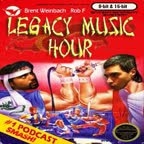



Vital stats:
Format: 8- and 16-bit video game music showcase
Duration:~1h
Frequency: weekly
Archive available on iTunes: all
When I first heard about The Legacy Music Hour [iTunes], a (a) podcast (b) devoted to video games but (c) mostly 20-year-old ones and (d) entirely to their music, I said the idea was so geeky that it almost comes around the other side to normal. But listening, I realized that, insanely geeky or just pretty geeky, it’s just the show me and the other members of a certain specific generational subgroup have been waiting for.
The program hosts, Brent Weinbach and Rob F., spend each hour trading off selections of video game music they’ve found particularly interesting in the past week. They will have spent that week searching for tracks from the games of certain developers, like role-playing titan Square [MP3]; certain composer, like Mari Yamaguchi [MP3] or Junko Tamiya [MP3] or “elevator” music [MP3]. And it’s not just any old video game music; everything comes from what these guys consider “the golden age of video game music,” the time of 8-bit and 16-bit consoles, roughly 1985 to 1995. (Golden age of video games themselves, if you ask me.)
The elevator music episode really started me thinking. Like so many Americans in their mid-twenties, I got into music itself by way of the music that happened to play in the video games I loved. This happened, of course, during Brent and Rob’s golden age. Back then, game developers couldn’t just hire “real” musicians to record “real” music; their composers had to work with within very — often very, very — specific hardware constraints, resulting in a wide array of highly distinctive sounds and styles that are only now coming into real fashion. Except for the hosts’ voices, there’s absolutely nothing recorded with a microphone on The Legacy Music Hour: it’s all the razor-sharp arpeggios of the NES; the compressed yet sweeping samples of the Super NES; the forceful thumps and buzzes of the Genesis; the gritty washes of the Turbografx-16.
Though I didn’t realize it at the time, the only music I liked as a little kid was video game music. I usually latched onto the kind of tracks Brent and Rob discuss in their surprisingly insightful breakdown of what constitutes the much-maligned “elevator” style. I’d never thought it about it before, but this show made me understand: I never played video games to win; I played almost purely for the aesthetic experience. It was about the graphics, the design, the sound effects, but most importantly, the music. I suspect a bunch of us 8- and 16-bit habitués have come to realize the same thing.
So it makes sense that I’d fall right into The Legacy Music Hour’s target demographic, but I insist there are also widely fascinating issues at work here about the interaction between aesthetics and technology, between compositional creativity and electronic limitations. Brent and Rob know this, and you can hear it when they occasionally find their way into serious examinations of what, musicologically, makes these tracks tick. I wish they’d do it for every piece they play, even if it means they have to play fewer of them. After all, these compositions, once largely written off as a bunch of childish bleeps and bloops, shaped a big part of this generation’s musical Weltanschauung. I know it shaped mine.
(And yes, JJGO listeners, they play stuff from Herzog Zwei.)
[Podthinker Colin Marshall also happens to be the host and producer of public radio’s The Marketplace of Ideas [iTunes], the blogger of The War on Mediocrity and the writer of The Ubuweb Experimental Video Project.]